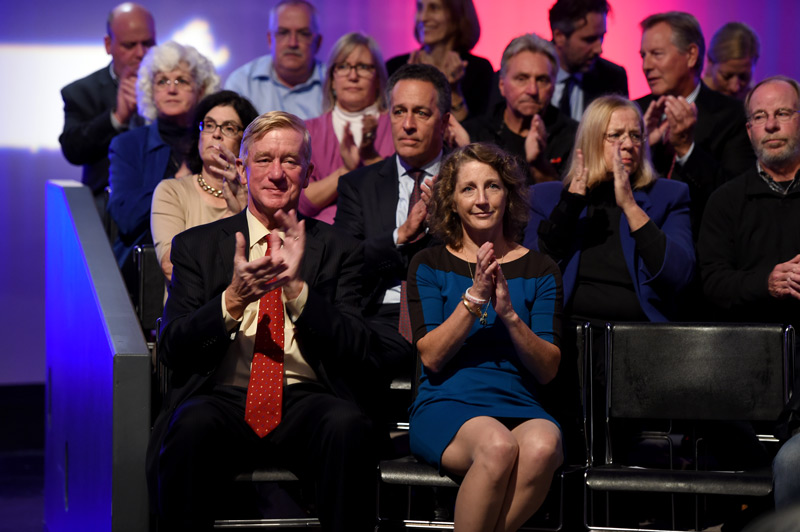
Bill Weld sat with Lauren Baker at the WGBH News/Boston Globe debate. Meredith Nierman photo.
Bill Weld has reemerged this campaign cycle as a big booster for GOP nominee Charlie Baker. He's also reminded us that he's not really a party man.
The former Republican Governor has endorsed two Democrats and earned the enmity of the tiny, but vocal, right win of his party.
RedMassGroup insisted that Weld should be drummed out of the state’s extreme minority party for his actions.
First Weld endorsed Democrat state representative candidate Mike Day over his conservative opponent in the 31st Middlesex District, Caroline Colarusso. Then he endorsed incumbent Senator Dick Moore in his race against Republican state representative Ryan Fattman.
Both are viewed as fairly close races and much needed pickups for a party languishing in obscurity in the Legislature.
This isn't the first time that Weld has run afoul of the puritans of his party.
In 1992, he tried to move the national party away from its ardent pro life platform. He was booed at the Houston Convention.
In 1994, on his way toward a historical reelection win, the Governor was accused of doing very little to assist Republicans down ballot.
He also famously joined a group of Republicans—from former Reagan Solicitor General Charles Fried to former Secretary of State Colin Powell and former spokesperson for George W. Bush Scott McClellan—who endorsed Barack Obama over the McCain-Palin ticket in 2008.
Weld clearly doesn’t mind playing the party pooper. It was arguably part of his appeal as the rogue and iconoclast in 1990s Massachusetts politics.
That personality fits, in part, executive power that makes strong party leadership hard to achieve.
The constitutional system of separate political institutions makes party leadership difficult under good circumstances. There are too many centers of power across the institutions and the levels of government. Strong party leadership in a system of diffuse power is not easy.
Given the trajectory of modern Massachusetts’s politics, the institutional reasons for difficult party leadership combines with the reality of political culture to make party building extraordinary hard for Republican Governors.
The have two choices: work with Democrats to get legislation passed or work against them to try a build their party.
All five modern Republican Governors worked with their Democratic legislature. Their party atrophied.
Mitt Romney followed the trend but tried to build his party at the same time, fielding a slate of legislative candidates to make inroads into Democratic dominance. He got his hat handed to him in 2004.
Democratic Governors face a different set of burdens since their party is hardly the monolith that some believe it to be.
But they simply don’t face the same acute problem as Republican Governors who may hope to pursue a successful legislative agenda that depends on Democratic votes. In his endorsement of Richard Moore, Weld noted the Senator’s service to Weld’s agenda in the 90s.
Weld’s endorsement is not likely to matter all that much. Unless he’s going to go door to door with Moore through the Worcester and Norfolk Senate district, it seems unlikely that large swath of voters are going to be move into Moore's column as a result of Weld's vote of approval.
It may help at the margins in a close race and if Fattman loses in a nail biter, the long knives will be out. I suspect Weld will pay it no attention.
It’s been a wild ride with him. From a huge defeat to Frank Bellotti in 1978 to an unlikely victory in 1990 then a historic win in 1994, it is safe to say that Weld has experienced the highs and lows of electoral life in the Commonwealth.
I saw Weld at the Republican Convention in 2012 at a breakfast for the state’s delegation. The press was there and he came down an expansive corridor on his way to the ballroom. Once the press noticed the flash of red hair, they quickly gathered. It seemed like old times. Indeed, he looked like he just came from a squash game: wet hair combed to the side, the impish grin, and the build of a man totally comfortable in his own skin.
He was back in the Massachusetts orbit after having decamped to New York, tried his hand at gubernatorial politics there, supported one of his successors in '08 only to back the Democratic nominee in the general election. In his interactions during the 2012 RNC, it was as if he had never left.
His recent cross-party endorsements will endear him to the old hands of Massachusetts politics while those angry few on the right, who never had much use for him, thrash about.
He won’t be thrown out of his party. The suggestion is silly. Party membership in the United States is not subject to loyalty oaths or litmus tests. I suspect, to the degree he even knows that some want him thrown out, he could care less. The Governor who left office by climbing into his SUV with a "Privatize Weld" bumper sticker on doesn't often fret over the slings and arrows of party politics.

